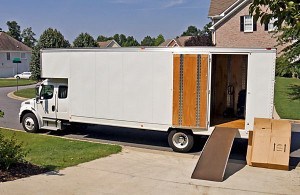How to Choose a Moving Company
Choosing the right moving company can be
hard work. In 2012, the Better Business Bureau received over 7,700 complaints
about movers in the United States. According to the BBB, most complaints
stemmed from alleged lost or damaged property, but charging for un-worked
hours, arriving late and not honoring estimates also made the list.
Get Referrals
Searching the Internet or browsing a phone
book for moving companies can be daunting. Start by asking friends, family
members and coworkers if they can recommend a moving company. If you’re working
with a real estate agent, ask the agent for a referral. You can also get quotes
from movers through Moving.com’s Find a Mover service
Follow the Rule of Threes
Don’t settle for the first estimate you
receive. Instead, ask at least three different companies to give you an
in-person estimate, since no company can really give you a thorough estimate
without seeing your stuff.
Watch Out for Red Flags
Keep an eye out for red flags during the estimate.
For example, most reputable moving companies won’t ask for a cash deposit
before you move. If the mover seems hungry to get the money upfront, it might
not be a legit business. Also, during the estimate, note how professional or
unprofessional the movers seem. If they show up late, seem unsure of their
abilities, or can’t answer your questions, look for another company. And be
wary of any movers who show up in a rented moving van. A professional company
will own its own equipment.
Make Sure the Mover Is Licensed and Insured
The U.S. Department of Transportation
Federal Motor Carrier Safety Administration issues a U.S. DOT number to
licensed interstate movers. If you’re moving out of state, verify the moving
company’s license through the FMCSA’s protectyourmove.gov site and request the
company’s U.S. DOT number; you’ll need it if you have to file a claim against
the company later. If you’re staying in state, check with your local consumer
affairs agency. You can find a list of local agencies through the FMCSA’s
contacts database.

Tips For Hiring Quality Movers
With millions of moves every year in the
United States, it’s a minor miracle that most of them go smoothly, with no
issues whatsoever. Hiring quality moves is a must, of course.
Moving inventory
A reputable moving company will take
inventory of all your belongings and determine the bulk and weight of your move
either in person or through a virtual survey. The estimator should be thorough
and check all of your storage places such as cupboards, drawers, garages and
bookcases. A large component of the mover’s price is based on the weight of
your stuff and the space your goods take up in the truck. Be sure you
understand this estimate and that it is as accurate as possible.
Get a thorough walk-through
An estimator who performs a quick
walk-through without noting what you plan to move is going to be off the mark.
A good estimator will ask questions about what you plan to take from your
current house to your next home. So, be sure you are prepared to tell the
estimator which items you don’t want on the truck—the items you plan to give
away, donate to a charity, sell in a yard sale, or leave behind for the new
owners.
Don’t pay a large deposit
Reputable movers won’t demand cash or a
large deposit before moving. You should only pay upon delivery. If you pay in
advance, you have no control over when you will see your belongings again. When
you do pay, use a credit card to help protect you from possible fraudulent
activity.
Avoid moving companies with a name switch
Some companies avoid being assessed by the
Better Business Bureau by doing business under a variety of names. Be sure the
company has a local address and information about licensing and insurance.
Their employees should answer the phone with the full name of the business.Find
out if there are any other names the company “does business as,” as well as
their state and federal license numbers. Search online to see if there are
complaints about the company.
How to Choose Movers that Are Right for You
When moving to a new home, hiring movers is
often the best way to ensure a move is quick, efficient and less stressful.
Think about it: movers do the packing, loading/unloading and transporting for
you. Still, as Marcia Passos Duffy, a blogger for Bankrate.com, says, “While
the right moving company can make for a smooth move, choosing the wrong mover
can make your relocation a nightmare.” So how do you make sure you choose the
right movers for you? See our tips below.
Movers that are licensed. When you’re
moving from one state to another, your movers must be licensed with the federal
government, which means they’ll be assigned a Department of Transportation
number. You can check ProtectYourMove.gov to ensure your movers meet the
necessary requirements. For local moves, every state has different licensing
requirements. If you’re moving within your state, call your state moving
association to check your movers’ licenses and other requirements
Movers that give you a written, in-home
estimate. In-home estimates are the best way for movers to give you a reliable
quote, since they can see how much stuff you have and whether there will be any
obstacles to your move (e.g., stairs, a hard-to-access location). Whenever you
get an estimate from a moving company, make sure it is in writing. You cannot
rely on verbal estimates
Movers that have good reviews. A moving
company may post testimonials on its site, and that’s a great starting place
for your investigation. But you’ll want to do your own research. Check with the
Better Business Bureau and other moving review websites to verify that the
movers you’re considering have great practices overall.
Experience. Think about how much experience
you want your movers to have. Sure, the new company might offer lower rates,
but you have to consider what you might be giving up in professionalism and
quality should you go with less experienced movers
How to Choose a Reliable Moving Company
That’s what Scheyda Mohammadian, a model
and public relations professional from Las Vegas learned the hard way. Last
fall, after searching on the web for a company to move her belongings from Las
Vegas to her new home in Texas, she decided to go with the one that offered her
the lowest price—$1,700.
After wiring a 50 percent deposit to the
company and paying $450 on moving day, she discovered that her possessions had
been moved only to a storage unit a few miles from her Nevada home. Then she
had to pay another $450 to the company to release her belongings
Hire a local mover. If you hire a moving
company based in your area, you’ll avoid being tricked into doing business with
an unscrupulous mover operating solely over the internet, says Scott Michael,
president and CEO of the American Moving & Storage Association, a trade
group that represents companies that handle local, interstate, and
international moves. Consider visiting the company’s office and checking out
its equipment, he says
Get estimates. Get at least three written
in-home estimates, Hutt advises. Be suspicious if an estimate is unusually low
or if the moving company provides an estimate over the phone or online without
sending a representative to scope out the job. It may be a sign of scam
Verify credentials. For moves between
states, a mover must have a number issued by the Department of Transportation.
It serves as a license that identifies commercial vehicles transporting
passengers or hauling cargo in interstate commerce. If the mover you’re
considering is licensed, it must provide the DOT number on its website and in
its advertising, says Kurt Larson, a spokesman for the Federal Motor Carrier
Safety Administration, a division of the Department of Transportation that
oversees truck and bus safety. The mover also must have a carrier number from
the Federal Motor Carrier Safety Administration

Picking a Moving Company: How Do Your
Choices Stack Up?
Selecting a moving company can be
overwhelming. You probably have a few friends with recommendations, and there
are plenty of movers’ ads online and offline — but which company’s the best
fit?
Licensed means safe
The first and most important point to
investigate is the company’s legal status. Movers may claim to be licensed and
insured, but unless you can confirm that, don’t take it at face value.
In-state moves
Many states have rules and regulations to
monitor household goods carriers at a local level. Usually the authorities
responsible for overseeing intrastate movers are the state Department of
Transportation or the Public Utilities Commission. Contact the relevant
authority.
Out-of-state moves
Check with the Federal Motor Carrier Safety
Administration (FMCSA), the agency that grants permits to all moving companies
engaged in the interstate transportation of household goods.
Overseas moves
Ensure that the ocean transportation
intermediary involved in the moving process is certified by the Federal
Maritime Commission (FMC), the federal agency responsible for regulating U.S.
international ocean transportation to protect U.S. consumers. Don’t even
consider moving to another country without researching whether your chosen
company has been approved by the FMC.